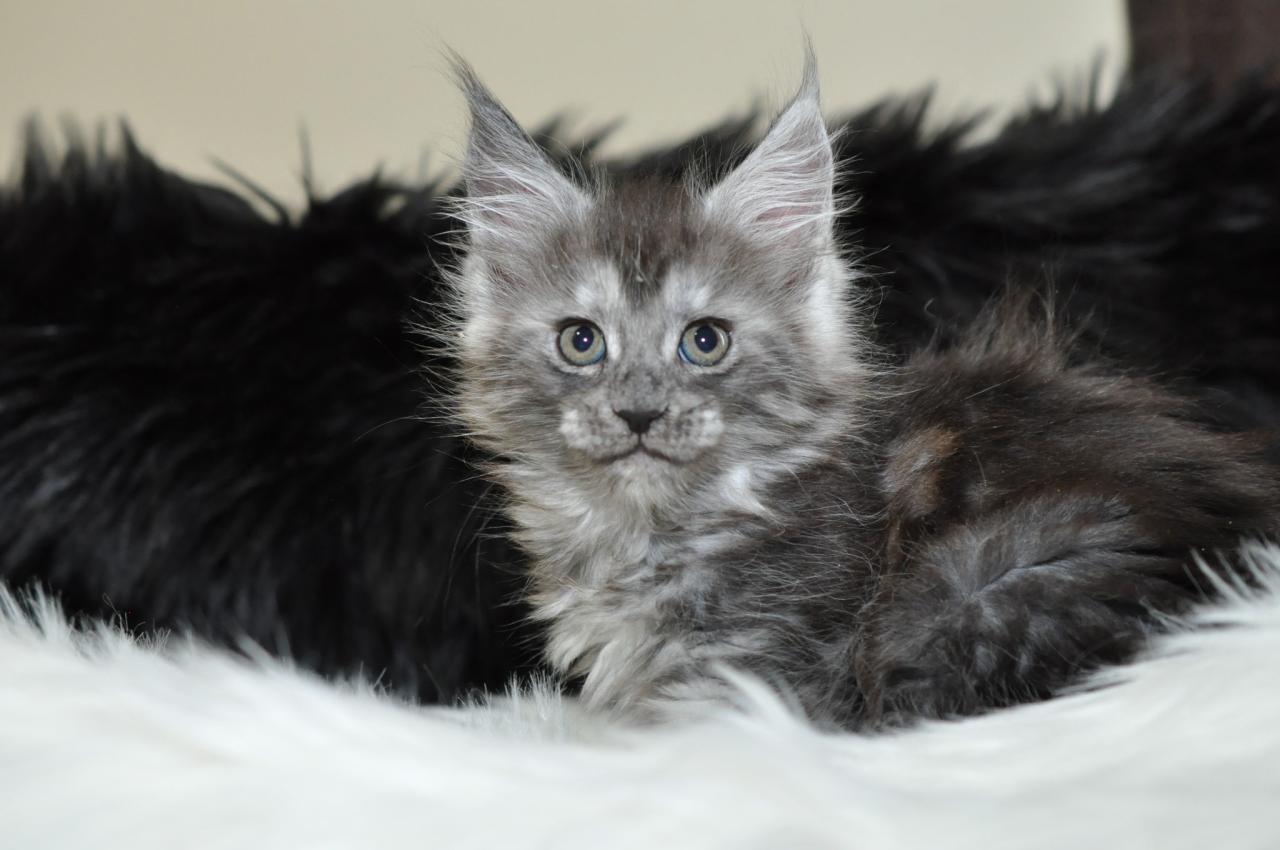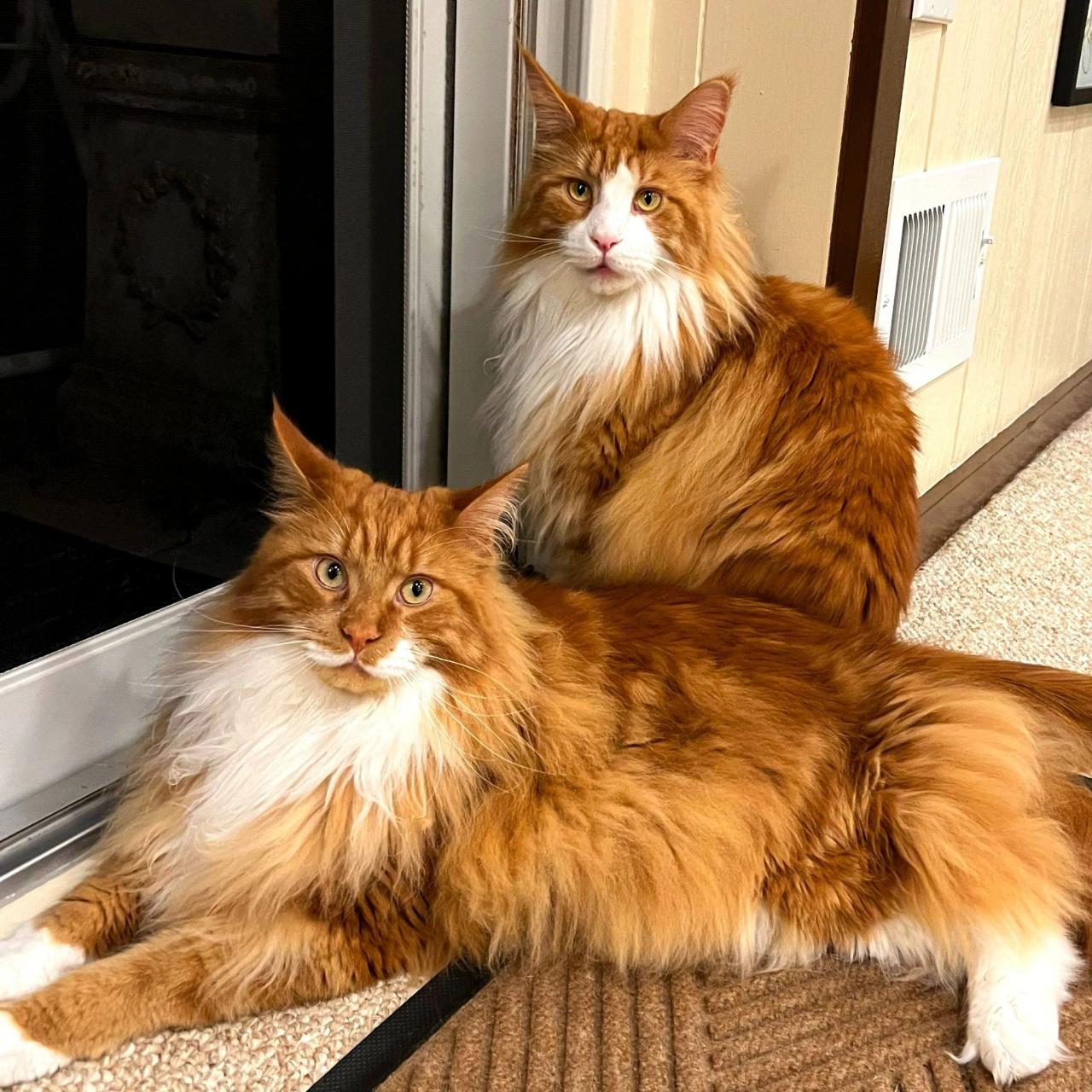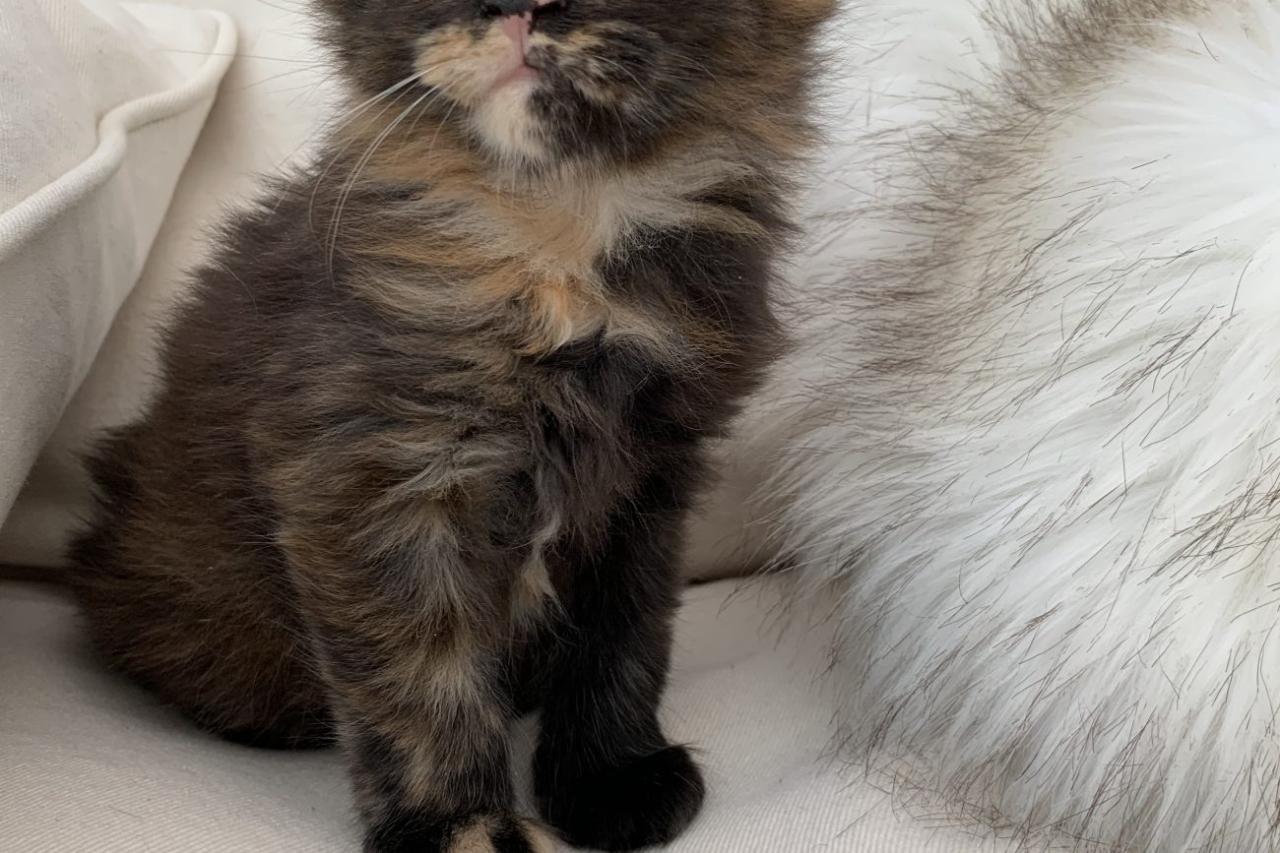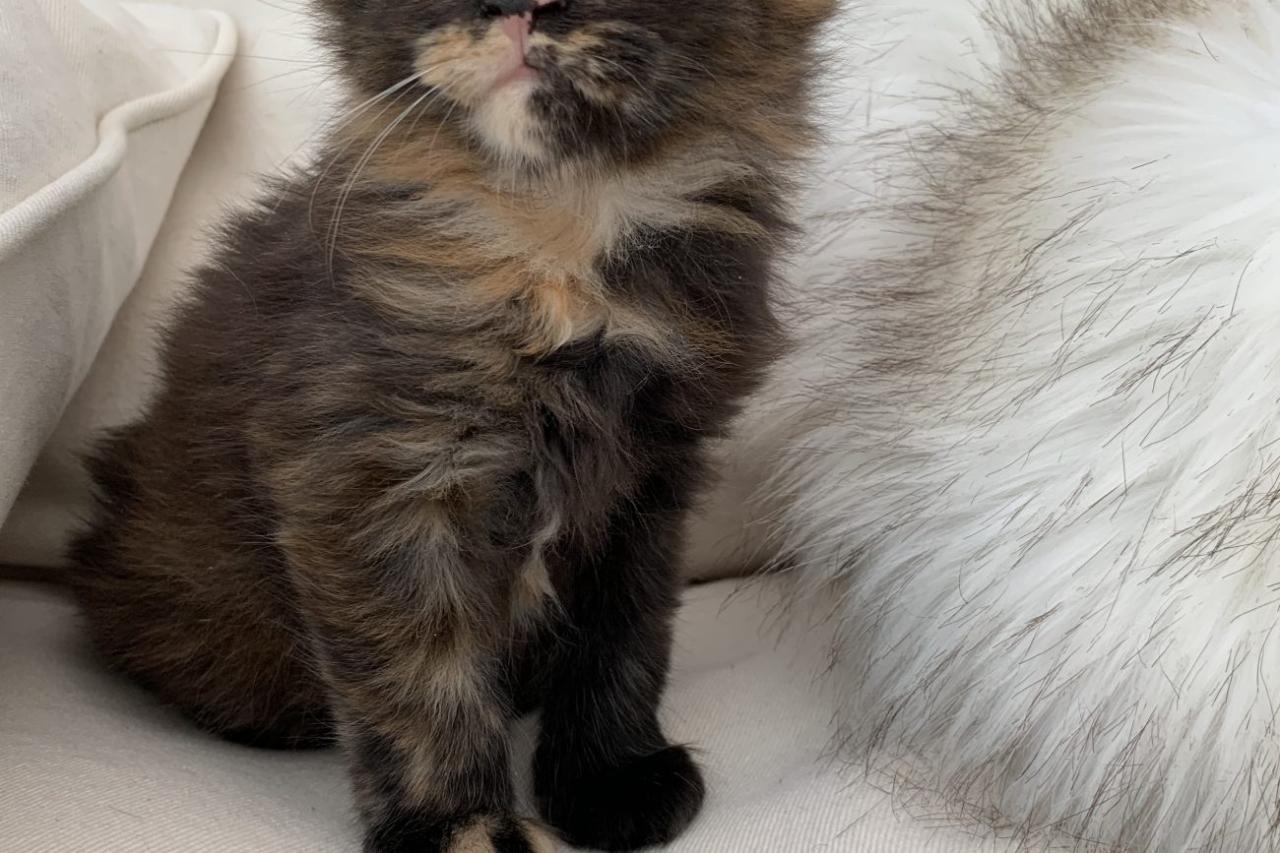Discover the allure of tortie Maine Coon kittens for sale, captivating felines with their distinctive markings and endearing personalities. Dive into the world of these enchanting creatures as we explore their unique traits, care requirements, and availability.
From their captivating tortoise shell coats to their gentle and playful nature, tortie Maine Coon kittens offer a delightful blend of beauty and companionship. Let us guide you through the intricacies of their care, ensuring a harmonious and fulfilling journey with your feline friend.
Breed Overview
Tortie Maine Coon kittens are a captivating combination of beauty and charm. These adorable felines inherit the distinctive physical characteristics and enchanting personality traits of both the tortoiseshell and Maine Coon breeds, resulting in a captivating companion.
Tortie Maine Coon kittens possess a mesmerizing coat that is a kaleidoscope of colors and patterns. Patches of orange, black, and cream swirl together, creating a unique and eye-catching appearance. Their fur is semi-long and plush, giving them a teddy bear-like appearance.
The distinctive ear tufts and bushy tail, signature features of the Maine Coon breed, further enhance their allure.
Personality Traits
Tortie Maine Coon kittens are known for their affectionate and playful nature. They are highly social and thrive on human companionship. These kittens are curious and love to explore their surroundings, often engaging in playful antics that will bring a smile to your face.
Grooming and Care
The semi-long coat of Tortie Maine Coon kittens requires regular grooming to maintain its beauty and prevent matting. Brushing several times a week is essential to remove loose hair and distribute natural oils throughout the coat. These kittens are generally healthy and require routine veterinary care, including vaccinations and parasite prevention.
Health Considerations
Tortie Maine Coon kittens, like any breed, can be prone to certain health issues. Understanding these potential problems and taking preventive measures can help ensure your kitten’s well-being.
Regular veterinary checkups and proper care are crucial for maintaining the health of your tortie Maine Coon kitten. By addressing any potential issues early on, you can help prevent serious health problems down the road.
Common Health Issues
- Hypertrophic Cardiomyopathy (HCM):This condition, which affects the heart muscle, is common in Maine Coons and can lead to heart failure. Regular echocardiograms can help detect HCM early on.
- Polycystic Kidney Disease (PKD):This inherited condition, which affects the kidneys, can cause kidney failure. Genetic testing can identify kittens at risk for PKD.
- Hip Dysplasia:This condition, which affects the hip joints, can cause pain and lameness. Regular exercise and maintaining a healthy weight can help prevent hip dysplasia.
Average Lifespan and Overall Health
With proper care, tortie Maine Coon kittens can have a long and healthy life. The average lifespan of this breed is 12-15 years.
By understanding the potential health issues associated with tortie Maine Coon kittens and taking preventive measures, you can help ensure your furry friend lives a long and happy life.
Socialization and Training

Tortie Maine Coon kittens are highly intelligent and social creatures. Early socialization is crucial for their development into well-rounded and well-adjusted cats. Proper training can also help them learn good habits and prevent behavioral problems.
Introducing to Other Pets and Children
Introducing tortie Maine Coon kittens to other pets and children should be done gradually and under supervision. Start by allowing them to interact with the other pets in a neutral area, such as a hallway or living room. Keep the interactions short and positive, and gradually increase the amount of time they spend together.
If the kittens show any signs of aggression or fear, separate them immediately and try again later.
When introducing kittens to children, teach the children how to approach and handle them gently. Supervise all interactions and ensure that the children are not rough or overly playful. Explain to the children that the kittens need space and time to adjust to their new home.
Diet and Nutrition
Tortie Maine Coon kittens require a well-balanced diet that meets their specific nutritional needs. Their diet should be rich in high-quality protein, healthy fats, and essential vitamins and minerals. A balanced diet will help them grow and develop properly, maintain a healthy weight, and have a strong immune system.
Sample Feeding Schedule and Meal Plan
A typical feeding schedule for a tortie Maine Coon kitten is three to four meals per day. The amount of food you give your kitten will vary depending on their age, weight, and activity level. It’s important to follow the feeding guidelines on the food packaging or consult with your veterinarian to determine the appropriate amount of food for your kitten.Here’s
a sample meal plan for a tortie Maine Coon kitten:*
-*Breakfast
1/4 cup of high-quality kitten food
-
-*Lunch
1/4 cup of high-quality kitten food
-*Dinner
1/2 cup of high-quality kitten food
-*Snack
1/4 cup of high-quality kitten food
You can also offer your kitten small amounts of cooked chicken, fish, or other lean meats as treats. Avoid giving your kitten table scraps or human food, as this can be harmful to their health.
Housing and Environment
Tortie Maine Coon kittens require a spacious and stimulating environment to thrive. Providing adequate space, toys, and scratching posts is crucial for their well-being and development.
Adequate Space
Tortie Maine Coon kittens are active and playful, requiring ample room to explore and exercise. Their large size necessitates a spacious living area with plenty of vertical space for climbing and perching.
Toys and Enrichment
Kittens need a variety of toys to stimulate their mental and physical development. Interactive toys, such as puzzle feeders and wand toys, encourage cognitive abilities and provide exercise. Scratching posts are essential for protecting furniture and satisfying their natural scratching instinct.
Safe and Comfortable Home
Create a safe and comfortable home for your kitten by providing soft bedding, cozy hiding places, and a designated litter box. Ensure the environment is free of hazards, such as electrical cords and poisonous plants.
Exercise and Activity
Tortie Maine Coon kittens are energetic and playful, requiring ample opportunities for physical activity to maintain their health and well-being. Regular exercise helps them develop strong muscles, healthy joints, and a lean body weight. It also stimulates their mental development and provides an outlet for their natural curiosity and playfulness.
Appropriate Activities and Playtime Routines
Provide your kitten with a variety of engaging activities to keep them active and entertained. These may include:
- Interactive Toys:Engage your kitten with toys like laser pointers, feather wands, and puzzle feeders that encourage chasing, pouncing, and problem-solving.
- Climbing Structures:Install cat trees or shelves that allow your kitten to climb and explore, satisfying their natural instinct to be up high.
- Playdates:If possible, introduce your kitten to other friendly cats for supervised play sessions. This provides social interaction and opportunities for chasing and wrestling.
Benefits of Regular Exercise
Regular exercise offers numerous benefits for tortie Maine Coon kittens, including:
- Improved Physical Health:Exercise helps maintain a healthy weight, reduces the risk of obesity, and strengthens muscles and joints.
- Mental Stimulation:Playtime and interactive activities provide mental stimulation, reducing boredom and preventing behavioral issues.
- Stress Relief:Exercise allows kittens to release pent-up energy and relieve stress, promoting a calm and well-adjusted demeanor.
Grooming and Hygiene
Tortie Maine Coon kittens are known for their long, luxurious coats. Proper grooming is essential to keep their coats healthy and free of mats and tangles.
Brush your kitten’s coat regularly, at least twice a week. Use a soft-bristled brush or comb to remove loose hair and prevent mats from forming. You should also bathe your kitten every 6-8 weeks with a mild shampoo designed for cats.
Trim your kitten’s nails as needed, usually once or twice a month.
Tips for Maintaining Their Long, Luxurious Coats
- Brush your kitten’s coat regularly, at least twice a week.
- Use a soft-bristled brush or comb to remove loose hair and prevent mats from forming.
- Bathe your kitten every 6-8 weeks with a mild shampoo designed for cats.
- Trim your kitten’s nails as needed, usually once or twice a month.
Breeding and Reproduction
Breeding tortie Maine Coon kittens requires careful consideration of genetic factors, health implications, and responsible practices to ensure the well-being of the kittens and the preservation of the breed’s unique characteristics.
The tortie coloration, a combination of black and orange, is a result of X-chromosome inactivation. Female cats have two X chromosomes, and in torties, one X chromosome carries the gene for black fur, while the other carries the gene for orange fur.
During embryonic development, one of the X chromosomes is randomly inactivated in each cell, resulting in a mosaic pattern of black and orange fur.
The temperament of tortie Maine Coons is influenced by both genetic and environmental factors. Torties are often described as independent, playful, and affectionate. However, individual personalities can vary, and responsible breeders will strive to select breeding pairs with desirable temperaments.
Responsible Breeding Practices
- Health testing: Breeding cats should be screened for genetic diseases common to Maine Coons, such as hypertrophic cardiomyopathy and polycystic kidney disease.
- Genetic diversity: Breeders should aim to maintain genetic diversity within the breed to avoid health problems associated with inbreeding.
- Kitten socialization: Kittens should be exposed to a variety of experiences and people from a young age to promote healthy socialization and reduce the risk of behavioral issues.
- Veterinary care: Regular veterinary checkups and vaccinations are essential for maintaining the health of breeding cats and their kittens.
Availability and Pricing

Tortie Maine Coon kittens are relatively rare, but they are available from reputable breeders. The availability of these kittens can vary depending on the breeder and the time of year. Kittens are typically available in the spring and summer months, when breeders have new litters.
The price of a tortie Maine Coon kitten can vary depending on several factors, including the kitten’s age, quality, and the breeder’s reputation. Kittens that are younger or have a higher quality coat will typically cost more than older kittens or kittens with a lower quality coat.
Breeders with a good reputation will also typically charge more for their kittens.
Tips for Finding Reputable Breeders
- Ask for references from other breeders or veterinarians.
- Visit the breeder’s facility and meet the kittens and their parents.
- Ask the breeder about their breeding practices and health guarantees.
- Make sure the breeder is registered with a reputable cat association, such as The International Cat Association (TICA) or the Cat Fanciers’ Association (CFA).
Tips for Avoiding Scams
- Be wary of breeders who offer kittens at a significantly lower price than other breeders.
- Never send money to a breeder without first visiting their facility and meeting the kittens.
- Be cautious of breeders who are not registered with a reputable cat association.
- If you are unsure about a breeder, contact your local animal shelter or veterinarian for advice.
Comparative Analysis: Tortie Maine Coon Kittens For Sale

Tortie Maine Coon kittens possess distinctive characteristics that set them apart from other similar breeds. By comparing them with tabby Maine Coons and calico Maine Coons, we can highlight their unique qualities and identify the most suitable breed for various lifestyles and preferences.
Tortie Maine Coon Kittens vs. Tabby Maine Coon Kittens, Tortie maine coon kittens for sale
While both tortie and tabby Maine Coon kittens share the same breed lineage, their coat patterns differentiate them. Tortie kittens exhibit a captivating blend of black, orange, and cream hues, creating a striking patchwork effect. Tabby kittens, on the other hand, display bold, contrasting stripes or swirls, ranging from classic brown tabby to striking silver tabby.
In terms of temperament, tortie and tabby Maine Coons are generally affectionate and playful. However, torties are often known for their independent streak, while tabbies tend to be more outgoing and social. Ultimately, the choice between a tortie or tabby Maine Coon kitten depends on personal preferences and the desired level of interaction.
Tortie Maine Coon Kittens vs. Calico Maine Coon Kittens
Tortie and calico Maine Coon kittens share similar coat patterns, with a mix of black, orange, and white hues. However, their distribution varies. Tortie kittens typically have a more even blend of colors, while calico kittens often display larger patches of white, giving them a more striking appearance.
In terms of personality, tortie and calico Maine Coons are both known for their affectionate and playful nature. Torties may exhibit a slightly more independent streak, while calicos tend to be more social and outgoing. The choice between a tortie or calico Maine Coon kitten ultimately depends on personal preferences and the desired coat pattern.
Final Review
Whether you seek a loyal companion, a playful addition to your family, or simply admire the beauty of these extraordinary creatures, tortie Maine Coon kittens offer an unforgettable experience. Their captivating presence and endearing nature will undoubtedly leave a lasting paw print on your heart.

